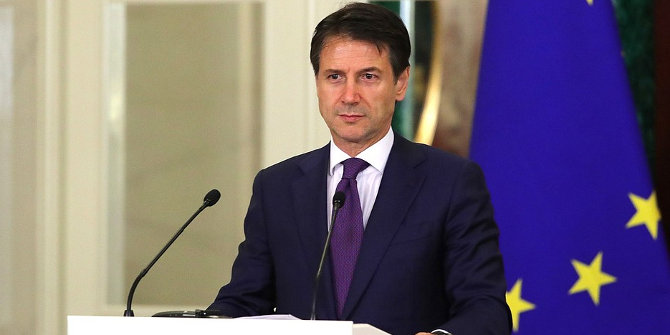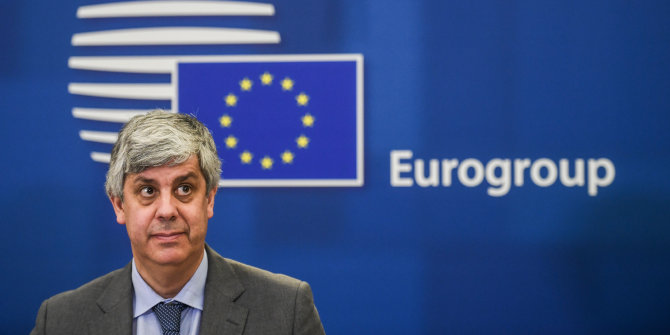 In his letter to Donald Tusk, David Cameron stressed the importance of Eurozone and non-Eurozone members being on an equal footing. Iain Begg argues that this request is problematic. Among the issues raised, he writes that it would be a mistake to think that the interests of the nine member states that are out of the Eurozone are closely aligned and that the numerical balance will remain the same in the long term. As a consequence, the UK may find that support from the non-euro countries is more brittle than Cameron expects.
In his letter to Donald Tusk, David Cameron stressed the importance of Eurozone and non-Eurozone members being on an equal footing. Iain Begg argues that this request is problematic. Among the issues raised, he writes that it would be a mistake to think that the interests of the nine member states that are out of the Eurozone are closely aligned and that the numerical balance will remain the same in the long term. As a consequence, the UK may find that support from the non-euro countries is more brittle than Cameron expects.
The long-awaited letter from David Cameron to Donald Tusk, detailing the areas in which the UK wants to secure a new settlement in its relationship with the EU, places considerable emphasis on the importance of respecting the differences ‘of its many member states’. It stresses that he wants the euro to succeed and will not stand in the way of the deeper integration that all sides agree are vital for its success. Equally, the UK case for a new deal for those outside the Eurozone emphasises that changes must ‘respect the integrity of the single market, and the legitimate interests of non-euro members’.
The first of the four areas for reform set out in the letter starts from this proposition that there are now ‘two sorts of members, those in and not in the euro’. It then lists a series of principles that should govern the future relationship between the two classes of members, with the tacit assumption that there is sufficient common ground among the ‘outs’ for them to have shared aims. There are two respects in which this strategy could prove to be risky.
First, although there is an evident cleavage today between the Eurozone nineteen and the nine other member states, it would be a mistake to assume that this numerical balance will persist, or indeed that the interests of the nine, as a bloc, are closely aligned. Certainly, the victory of the Law and Justice party in Poland’s October 2015 general election and the current stances of the Czech and Hungarian governments make early accession to the euro unlikely. However, only Denmark, formally, has no obligation to join the euro whereas, in technical terms, the seven others (including Sweden, regarded by many as closest to the UK in its opposition to the euro) are in ‘derogation’ – that is deemed not yet to be able to join the euro – but still expected to do so in due course.
The settlement that the UK seeks is, however, for the long-term and will require treaty change, so that the political dynamics cannot be ignored. Moreover, governments in most of the ‘out’ countries have rarely lasted more than one term and further changes in sentiment towards the euro could happen quite quickly. Over the next decade, it is likely that enough progress will be made in completing the governance reforms needed to strengthen economic and monetary union and ensure its long-term sustainability. When (rather than if) that process nears completion, today’s justifiable suspicions about joining a failing enterprise based on a flawed architecture of economic governance will abate and the advantages of being part of the euro club will again influence the debate.
It is also noteworthy that all the other outs are now signatories to the separate inter-governmental treaty establishing the ‘fiscal compact’ – the arrangement under which fiscal policy is more closely coordinated among countries – and that, unlike the UK, several seem disposed to be part of the banking union that is progressively being constructed. Even Denmark, despite its formal opt-out, has maintained a fixed exchange rate against the euro through its participation in the exchange rate mechanism (ERM II) which came into being after the launch of the euro. In short, rather than the division being between the nine and the nineteen, the chances are that several of the nine will switch sides over a ten or twenty year horizon, leaving the UK in a shrinking minority.
Poland is likely to be pivotal in this regard and is already positioning itself as a leader among the increasingly assertive central and eastern European bloc of member states. Although some observers wonder whether there might be traffic in the other direction – notably renewed speculation about a ‘Grexit’ – research conducted in mid-November for The UK in a Changing Europe project found that there is no real appetite in Greece for leaving the euro. In addition, given how long treaty change takes and the likely reluctance of the European body politic to want a further revision soon, the underlying question many negotiators will pose is whether significant changes to accommodate the non-Euro countries can be justified.
The second risk concerns the nature of further economic integration. The rationale behind Cameron’s position is that some of the actions that the Eurozone might take to enhance the functioning of the euro could have an adverse effect on the single market. The latter is about ensuring the free movement of goods, services, labour and capital. The UK concern is that actions to shore-up the ‘monetary’ in economic and monetary union (EMU) could lead to conflicts if they erect new barriers to these four freedoms. However, this analysis neglects the fact that the ‘economic’ in EMU is about much more than the single market.
An economic union implies the building up of common policies and economic institutions. The emerging banking union, for example, entails a common approach to prudential supervision of banks and mechanisms for resolving failing banks, with the latter including a common resolution fund to facilitate the orderly winding-up of failing banks. A potential extension of banking union will be the establishment of a form of common deposit insurance, more limited than the extensive federal provisions in the United States, but nonetheless implying closer economic integration.
Other directions in which an economic union move could include a collective approach to corporate taxation, something that would allay public concern about the ability of many multi-national companies to play governments off against each other, or measures to integrate labour market policies. None of these will happen overnight and the appeal to the integrity of the single market will continue to resonate for many other member states, but the UK does need to be aware that the euro cannot be seen purely as about the currency.
It is worth pointing out, too, that while there will be some sympathy with Cameron’s insistence that the non-Euro countries should not be liable for the costs of dealing with Eurozone problems, there will still be occasions when a country requires support from the EU as a whole. This happened with Romania and Hungary during the financial crisis, resulting in EU-28 mechanisms being deployed to assist them financially.
The difficulty that will arise is judging when an economic problem is purely euro-related or might justify a full EU-28 engagement, or indeed a voluntary contribution from outside the Eurozone, as when the UK participated in the Irish bailout in 2010.
The conclusion to draw is that the UK may find that support from the non-Euro countries is more brittle than the Prime Minister expects and that by focusing mainly on tensions between the euro and the single market, insufficient attention will be paid to the deepening of integration underway as part of the construction of economic union.
Please read our comments policy before commenting.
Note: This article first appeared at The UK in a Changing Europe. It gives the views of the author, and not the position of EUROPP – European Politics and Policy, nor of the London School of Economics. Featured image credit: Public Domain
Shortened URL for this post: http://bit.ly/1SFQImi
_________________________________
 Iain Begg – LSE
Iain Begg – LSE
Iain Begg is Senior Fellow on the Economic and Social Research Council’s The UK in a Changing Europe and Professorial Research Fellow at the European Institute, London School of Economics and Political Science.




